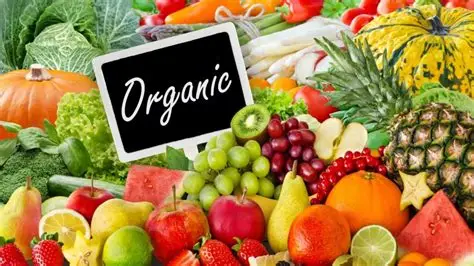Organic foods are often marketed as healthier, safer, and more sustainable. But are they truly worth the higher price tag, or is it mostly hype?
Introduction
Nowadays, organic labels can be found on anything from fruits and vegetables to meat, dairy, and even packaged snacks when you walk into any supermarket.
Due in large part to customer demand for safer, healthier, and more ecologically responsible products, the organic food sector has expanded quickly during the last ten years.
However, as organic products are frequently much more expensive than conventional ones, many consumers question if the advantages outweigh the costs.
You can make better food decisions if you know what “organic” actually means, how it impacts your health, and what the evidence indicates.
What Does “Organic” Really Mean?
Organic food is produced without synthetic pesticides, fertilizers, genetically modified organisms (GMOs), or artificial additives.
For meat and dairy, organic certification requires animals to be raised without antibiotics or growth hormones and to have access to outdoor grazing.
The goal of organic farming is to prioritize soil health, biodiversity, and sustainability. However, it’s important to note that “organic” doesn’t mean chemical-free natural pesticides and approved substances may still be used, though generally in lower amounts than in conventional farming.
MUST READ:How to Stay Healthy Working a 9–5 Desk Job
Nutritional Differences Between Organic and Conventional Foods
Studies comparing organic and conventional crops reveal mixed results. Some research suggests organic fruits and vegetables may contain slightly higher levels of antioxidants, such as polyphenols, which help fight inflammation and chronic disease.
Organic dairy and meat have been found to contain more omega-3 fatty acids, likely due to the animals’ grass-fed diets.
However, the differences are not always dramatic, and for many nutrients, conventional foods provide similar amounts.
The key takeaway is that while organic foods may have some advantages, the overall quality of your diet matters more than whether everything is organic.
Pesticide Exposure and Food Safety
One of the biggest reasons people choose organic foods is to avoid pesticides. While conventional produce does contain residues, these levels are usually far below the safety limits established by regulatory agencies.
That said, choosing organic may reduce overall exposure to synthetic pesticides, which can be particularly appealing for vulnerable groups such as children or pregnant women.
Washing and peeling conventional produce also reduces pesticide residues significantly, making both organic and non-organic foods generally safe to eat.
Environmental Benefits of Organic Farming
Organic farming often uses practices such as crop rotation, composting, and reduced chemical inputs, which improve soil quality and reduce pollution.
It also encourages biodiversity by supporting pollinators and wildlife habitats. However, critics argue that organic farming typically produces lower yields compared to conventional methods, requiring more land to grow the same amount of food.
This raises questions about scalability and whether organic agriculture alone can meet the demands of a growing global population.
Taste and Quality Perceptions
Taste is subjective, and while some people insist organic produce tastes fresher and more flavorful, studies don’t consistently support this. Factors such as ripeness at harvest, storage, and transportation often play a bigger role in taste than whether a food is grown organically or conventionally. Still, local and seasonal organic foods may taste better simply because they’re fresher and less processed.
The Cost Factor
Price is one of the main barriers to eating organic. Organic farming practices are more labor-intensive and often yield less, leading to higher costs for consumers.
While some people view the price as a worthwhile investment in health and sustainability, others find it prohibitive.
A balanced approach is to choose organic selectively ,for example, prioritizing organic for produce that tends to carry higher pesticide residues, while buying conventional for others.
Should You Switch to Organic?
For many, the decision to buy organic is less about nutrition and more about reducing chemical exposure, supporting sustainable farming, and aligning with personal values.
From a purely nutritional standpoint, eating a variety of fruits, vegetables, whole grains, and lean proteins is more important than whether those foods are organic or conventional.
If organic foods fit your budget and lifestyle, they can be a valuable addition to your diet. But if cost is a concern, choosing fresh, minimally processed conventional foods is still a healthy choice.
Final Thoughts
Organic foods offer certain advantages, including reduced pesticide exposure, potential nutritional benefits, and positive environmental impacts.
However, the differences compared to conventional foods are not always dramatic, and the higher cost can be a barrier for many households.
Ultimately, the healthiest choice is to eat a diet rich in fruits, vegetables, and whole foods, regardless of whether they are organic or not. Organic foods can be worth it for those who value sustainability and reduced chemical use, but they are not the only path to a healthy lifestyle.


